Peter MALONE
Saturday, 18 September 2021 19:56
Magic Mike XXL
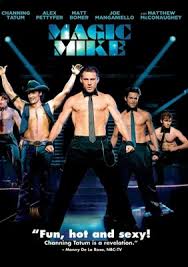
MAGIC MIKE XXL
US, 2015, 115 minutes, Colour.
Channing Tatum, Joe Manganiello, Matt Bomer, Adam Rodriguez, Kevin Nash, Gabriel Iglesias, Jada Pinkett Smith, Donald Glover, Andie Mc Dowell, Amber Heard, Elizabeth Banks.
Directed by Gregory Jacobs.
Big audiences hurried to Magic Mike back in 2012, eager to participate in the lives of a group of male strippers, their characters, their routines, their emotional tangles, the phenomenon of performing at club nights for women to come to ogle the dancers, throw money at them and shriek at the experience.
In many ways, much the same this time. It is explained to the audience and characters that Dallas, the manager, played by Matthew Mc Conaughey, has gone out on his own. Mike himself, Channing Tatum, has not been dancing for three years and has been trying to run a furniture business, trying to make ends meet, trying to provide pay for his one employee. Then he gets a call from one of his old associates, Tarzan, who seems to indicate that Dallas has died, so off goes Mike to a wake – which is anything but! And, before you can say magic, Mike decides that he wants to join the group and go on one last trip and gig to the strippers’ convention in Myrtle Beach.
This reviewer didn’t find the first film particularly interesting though it had a certain verve. While there is some verve here, it is not enough to make the film really interesting unless you are an avid devotee of the strippers who like to call themselves male entertainers.
On the road, they have a car accident, lose the MC, while Mike has a brainwave to look up an old flame who runs a strip club for African- American women, Domina. As the troupe call in, there are quite a number of acts in her club, plenty of shrieking women again, and a seemingly endless pile of dollar notes to throw at the men. Of course, the acts are lewd and suggestive and the whole thing is pretty raucous, run by Rome, Jada Pinkett Smith. The next stop is at the home of a young woman, Amber Heard, whom they met on their travels, to a group of wealthy white Southern women, led by Andie Mc Dowell, who shriek less, but who have many more dollars, and more of the suggestiveness.
While lewd and suggestive are words that seem to have moralistic tone, and they do, some of the ordinary bloggers on the Internet Movie Database, bring up a word which means the same thing but it is more ethically neutral. It is the word classy – and commenting that Magic Mike XXL and the performances are certainly not classy at all.
There are a lot of scenes of bonding between the men, some rehearsals when they get to Myrtle Beach, though how the staging and the performances that follow could be prepared in such a short time only Hollywood could tell. Each of the entertainers gets his own act, but since it is a convention, there are many more women to shriek, and we are shown the cash machines doling out dollars and dollars for eager responses.
Magic Mike XXL will find its audience – but it may well be much smaller than the first film (though Channing Tatum seems more alive to than usual!).
Published in Movie Reviews
Published in
Movie Reviews
Tagged under
Saturday, 18 September 2021 19:56
Family Affair, A/ 2015

A FAMILY AFFAIR
Greece/Australia, 2015, 82 minutes , Colour.
The Xyloouris Family: Antonis, Georgis, Shelagh, Nikos, Antonis and Appolonia.
Directed by Angeliki Aristopoulomenou.
There will not be too many people around Australia, let alone the world, who have not been hearing about and thinking about Greece in recent months, even years. And that is all about finance, debts, repayments, currencies and the European Union. And divisions between yes votes and no votes.
This is a film, however, A Greek- Australian co-production that will have everyone saying yes.
The settings for the film are Crete with its long historical traditions, especially its music traditions, and Australia where many Greeks have settled and brought the music with them. Which means that this is a multi-cultural film experience, a pleasure for Greek audiences, especially in Crete, and a pleasure for multi-cultural Australian audiences who appreciate different styles of music, different instruments and skill in playing them.
As for the title, this is definitely a family affair. The Xylouris family has developed a very strong tradition, the music and performance techniques being handed on from generation to generation. The film focuses particularly on Georgis Xylouris, well respected in Greece, a musician who has toured the world (and there are scenes from his playing in several Western European countries). He has also visited Australia, and in this film, there are scenes from 2012, the Womadelaide Festival as well as concerts in the Forum Theatre in Melbourne and some rehearsals and radio interviews. Accompanying Georgis is his father, a strong patriarch, an expert player from George inherited his talent.
But, the film, veering between mountainous landscapes at home and the vast open terrain of Australia, the film has quite a number of Australian connections. George is married to his Australian wife, Shelagh, who lives in Crete and has brought up three children. But, the two boys, talented musicians in themselves, have come to Australia for university studies and, as the film opens, the younger sister, Apollonia, is moving also to Australia, for study but also for performances. She is a touch nervous as she practises, especially in the presence of her grandfather.
Any documentary about a close family has its attractions, as does this one. When there are loving bonds which are lived every day through music, strings and lute, the bonds are even stronger.
The film serves as a positive reminder of the best in Australian multiculturalism.
Published in Movie Reviews
Published in
Movie Reviews
Tagged under
Saturday, 18 September 2021 19:56
Amy/ 2015
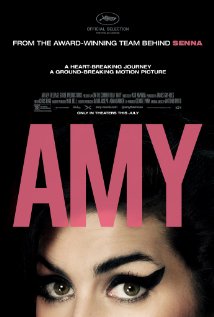
AMY
UK, 2015, 128 minutes, Colour.
Directed by Asif Kapadia
Amy Winehouse made her mark on the world, the world of popular music, having a career that spanned ten years, winning several Grammy awards, including Best Song with Rehab, an award for Best young British talent of the year, praised as having a strong voice for jazz.
That may mean that while she did have a large following, there are a lot of people who knew her only from headlines or from tabloid stories. And she certainly had a tabloid kind of life, a celebrity who rose high and certainly fell low.
Asif Kapadia has made a number of documentaries as well as some feature films, especially The Warrior, set in India, and the documentary biography of racing driver Ayrton Senna. He received quite some praise for that documentary and already has won critical praise for this film about Amy Winehouse.
Anyone, musical or not, who is interested in the contemporary cult of celebrity will find this portrait and this study quite interesting. What the director and his researchers have done is to assemble a great deal of footage from her initial auditions to her death, 2001 – 2011. There is plenty of visual material to draw on, auditions, rehearsals, recordings, concerts, home movies with friends, television footage. As well, there is quite an amount of audio material. And there are many, many interviews with her mother, with her father, with her close friends, and managers, promoters, bodyguards…
The director has been skilful in assembling his material, sometimes having voice-over of Amy with different pieces of footage or photos from other times, making the impact of his images and sound more complex.
The film is put together in chronological order, with some flashbacks to Amy’s life as a child and growing up. it is a picture of a Jewish girl from North London - and images of Barbra Streisand come to mind as we see her, her looks, her forthright manner, her strong voice and singing style. Her father was absent during a lot of her childhood but emerged later and undertook her management, criticising this present film for not doing justice to his daughter and putting him in a bad light – and his wanting to make his own film, something of which he did during his daughter’s lifetime.
Audiences interested in the music industry will find that there is meticulous detail about and interviews from those involved with her career, as they worked with her and helped her, the difficulties they experienced, especially in her final years, the successful concerts, records, the Grammys. The range of people interviewed gives an overall picture of Amy Whitehouse’s career.
On the personal level, it is said that she was shy even though she came across publicly as one of those forthright Jewish personalities. She did smoke pot in her early years, but eventually was introduced to cocaine, which led to heroin – and the comment made by her during the film that life without drugs was boring. It also emerges that what looked like to be a hearty appetite was, in fact, bulimia.
She had many boyfriends, friends commenting on some promiscuity in her life, marrying a boyfriend who may have been instrumental in the drug use, supporting him when he was arrested and imprisoned for impeding the course of justice, the marriage ending after two years in divorce.
The other point that the film wants to make is that she had celebrity thrust upon her very early, like many a child actor, performer, sports man or woman, which means that they were still developing their personality while expected to be competent in coping with the wider world – and being cut off more and more from the difficulties of real life, being pampered and spoilt, people responding to their whims, paparazzi pursuing them, and not enough time to be by themselves, to think, to appreciate what was happening to them.
This is significant for Amy Whitehouse’s songs. She is praised by many, by a singer she greatly admired, Tony Bennett, with whom she did a duet, filmed and shown here. She appreciated singers like Sarah Vaughan and was considered to have a wonderful sense of jazz, rhythms and timing. The lyrics which appear during the film, often literally on screen, help the audience realise that they were all about her, her life, her feelings, her relationships, not exactly narcissistic, but self-preoccupied, using the lyrics and the rhythms to express a lot of her troubled personality and what was happening in her inner and her out of life.
Some have complained that the film does not include everything – but, after all, it runs just over two hours and there will be necessary omissions from the point of view of the selection of the director. While it does serve as a basic biography, it is, more importantly, a cinema portrait.
Published in Movie Reviews
Published in
Movie Reviews
Tagged under
Saturday, 18 September 2021 19:56
Wings of the Dove, The
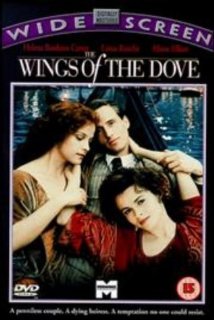
WINGS OF THE DOVE
UK, 1998, 97 minutes, Colour.
Helena Bonham Carter, Linus Roache, Allison Elliot, Alex Jennings, Charlotte Rampling, Michael Gambon, Elizabeth McGovern?.
Directed by Iain Softley.
Wings of the Dove is by Henry James with a later setting than Jane Campion's Portrait of a Lady, from the novel's 1902 to 1910 - giving it the Edwardian pre-war feel plus phones, the London Underground and tourism in Venice. But the film is really a three-hander, played beautifully by Helena Bonham Carter (Oscar-nominee) as the earnest but controlling Kate who risks love for financial security, by Linus Roache (Priest) as Merton the working journalist who loves her but who is asked by her to be kind to her American friend, Millie (Allison Elliot).
The film works subtly, drawing its audience into the small intricacies of relationships and society's moral and behavioural expectations. When the three holiday in Venice, Kate's scheme is too cleverly involved to be resolved happily. I think my review is only half a review. I found, somewhat to my surprise, that by the end I had so identified with the Linus Roache character and his decisions, that I was not sure how to respond to the experiences of the two women. I felt the need to read or hear a woman's review to learn a woman's perspective on and appreciation of what Kate and Millie felt. I say this as a compliment to the screenplay and the performances and their evocation of complex emotions.
1. The reputation of Henry James and his novels? Classics? The range of the film versions? His interest in society, British society, Americans within the society? Love, relationships? Money and financial situations?
2. 1910 setting, the Edwardian era, the eve of World War I? London, the Underground, buses, taxis? Homes, London streets? The opium den? Newspapers? Costumes and decor? The style of the period? The musical score?
3. The contrast with Venice, the beautiful city, the canals, the buildings, churches? The people, the hotels, the gondoliers?
4. The introduction to Kate, on the Underground, getting a seat, the encounter with Merton, in the lift, the kiss – and getting to know each other over the year? The attraction? Merton and his work, newspapers, meetings, criticisms? Kate and her situation, the dead mother, marrying her husband, his taking the money, Kate separated from him, his drug addiction, going to visit him in the den, his wise advice? Kate and dependence on aunt, her aunt’s strict control, the importance of finance? And the aunt sending some money to the father every week?
5. The meeting with Lord Mark, at the social, his comments about mothers and getting the daughters to meet prospective husbands? His drinking? The attraction to Kate? Visiting the house, conversations? His encounter with Millie? The attraction, marrying for money?
6. The character of the aunt, restrictive, rigid, the control of the family’s wealth, the discussions, knowing about Kate’s visits to her father, the visits to Merton?
7. Millie, American background, travelling Europe, charm? Meeting Lord Mark? Meeting Kate? The friendship, meetings, going out together, the meeting with Merton, Millie’s attraction? The doctor, the information about her health, terminal illness? The decision to go to Venice?
8. The beauty of Venice, arriving, the gondoliers, the hotel, the comfort? The friendship with Susan, older, serving as a chaperone, her concern about Millie’s health?
9. The tourist aspects of Venice, the visuals, the situations? The gondolas, the gondoliers?
10. Kate persuading him Merton to come, egging on his attention to Millie, Merton’s character, his love for Kate, the meetings with Susan, the time with Millie? Kate wanting him to give attention to Milly? Kate’s motives, that Merton would inherit the money from Millie? And that she would marry Merton? The visit of Lord Mark, Kate telling him about Millie’s health? His comment about marrying for a short time?
11. The effect of Venice on Merton, Kate and his love for her, her decision to back to London, wanting Merton to give Millie his attention? Merton, his motives, his attentiveness to Millie, the various trips, walking around Venice, missing each other? Her falling in love with Merton, loving his company? His continual attentiveness, devotion, sympathy? The affection for Millie, though not love? Her illness, lying on the lounge, Merton and his visit, his attention to Millie, his apology to her? Susan and intervention?
12. Kate, returning, Millie’s death, the funeral? The effect on Merton, on Kate, on Susan?
13. The return to London, Kate and her delay in meeting Merton, the letter, that Merton would inherit Millie’s wealth? His not wanting it, planning to write a letter rejecting it? Kate and her seductive behaviour, the sexual relationship, the aftermath, the marriage and his condition that he reject the money? Her conditions?
14. A portrait of people, feelings, emotions, judgements of the mind, of conscience, of principle? The ability of people to exploit one another? The ability of people to act with integrity?
Published in Movie Reviews
Published in
Movie Reviews
Tagged under
Saturday, 18 September 2021 19:56
Judge Steps Out, The
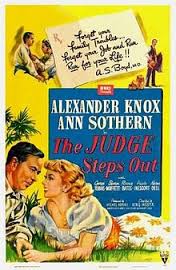
THE JUDGE STEPS OUT
US, 1947, 91 minutes, Black and white.
Alexander Knox, Ann Southern, George Tobias, Sharyn Moffett, Ian Wolfe, Florence Bates, Frieda Inescourt, Myrna Dell, in, H.B.Warner, Martha Hyer.
Directed by Boris Ingster.
The screenplay for this film, on a film from RKO with a strong cast, is both serious and comic. It is based on a story by the director, Boris Ingster, who had directed The Stranger on the Third Floor, made only one more feature film but worked in television. He and star, Alexander Knox, wrote the screenplay, a vehicle for Knox.
He portrays a judge in Boston, stifled by its stuffiness, by his very proper wife, Frieda Inescourt, giving money to his daughter who is to about to marry into a wealthy family. He is supported by the man in charge of his office, played by Ian Wolfe. He gives a legally correct but emotionally wrong decision in a custody case. When offered a lobbying job in Washington, he agrees to go to investigate but, feels stomach problems on the way, calls into a local doctor, who has a drinking habit, who gives some good advice to forget everyone and everything. He goes fishing with the doctor, plans to go back home, but misses his train and travels to California where he thumbs lifts, meets an agreeable young orphan, encounters the manager of a diner, gets into some trouble but stays to work with her. All goes well, everybody thinking he had disappeared, but he is concerned when the local judge gives a similarly severe judgement about the custody of an orphan. Ann Sothern, only two years younger than Knox, is engaging as the manager of the diner.
The film was made in 1947 and, though there are divorce sequences, the expectation of the Motion Picture Code is that people stay together – portrayed convincingly and heroically when the judge returns, intervenes in the previous judgement, where there is an appeal because of his alleged prejudice against the mother; he is congratulated and offered a higher position in accordance with his skills. The owner of the diner travels to Boston but realises that his life is there and in the law, and she returns home, happy that she can adopt the orphan.
One point of interest is to see Florence Bates in a very sympathetic role, Hispanic accent and all – rather than the very haughty dames she so often portrayed.
1. An agreeable drama with touches of comedy? The moral values of the postwar era? Marriage, failures in marriage, love, performance, re-marriage? Careers?
2. The Boston setting, black and white photography, homes, society, the courts? The jokes about Boston being stuffy? The contrast with California, the desert, the diner, the friendly people? Los Angeles, the judge? The musical score?
3. The title, the focus on Tom, his age, marriage, his daughter, the tension with his wife and her interest in society, his daughter becoming engaged to the wealthy man, their wanting money from him, forgetting his birthday? At court, Hector and his continued loyalty, the birthday gift, the judges singing greetings? His getting the difficult case? Hearing the sides, his dislike of the showgirl widow, her husband killed in the war effort, his father wanting custody of the child to give it every benefit? Her grief at the decision?
4. The wedding, the reception, his drinking, the discussion with the father-in-law, the need for a lawyer, a career path, stock and benefits? His wife wanting him to accept? His thinking about it, on the way to Washington to investigate?
5. His physical pains, going to the doctor, the friendly doctor and his drinking problem? Probing, the pains, the diagnosis, the advice to let everything go? The fishing? The two going fishing, happy discussions? Tom forgetting to send the telegram? Continuing on, the doctor tearing up the telegram, listening to people on the train talking about his potential job?
6. The decision to step out, and finding his way, talking with Nan, discussing books, the introduction to Peggy, the accusation that he was stealing, Peggy saving him, Chita and taking the five dollars? His return, the invitation to stay, his becoming a short order cook, enjoying the relaxation, talking with the customers, telling stories?
7. Mike attracted to Peggy, calling the Sheriff, Tom thinking he was exposed – but being asked return on the books?
8. Falling in love with Peggy, taking her to the restaurant, then not staying? The new suit? Going bowling? Talking, falling in love? Peggy’s story, the rash marriage, the divorce, the loss of her child, wanting to adopt? The birthday party, Nan not coming, Peggy’s response, the children?
9. Chita, Hispanic, her accent, friend, good advice, working, understanding Tom?
10. The upset for Peggy, Tom and his providing the documents, going to see the judge, being advised to get help for his drinking, the decision against Peggy having the girl?
11. His telling the truth, his having to return, deciding to go, back in Boston, received by his wife, his daughter and her disowned husband, his art? His cold, Hector, studying the books, wanting to intervene, the talk about prejudice, his going to the judges, some judges reacting against ? The chief Justice and his interest, enthusiasm, winning the case? Becoming famous?
12. The judge in California, and admiring Tom, custody for Peggy? The phone calls, the flying to Boston, his meeting, the discussion about his future, her self-sacrifice, that Tom was in the right place, his legal work?
13. Happy ending, self-sacrificing ending?
Published in Movie Reviews
Published in
Movie Reviews
Tagged under
Saturday, 18 September 2021 19:56
Eliza Graves/ Stonehearst Asylum
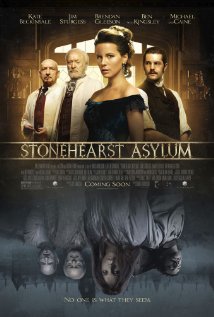
ELIZA GRAVES/ STONEHEARST ASYLUM
US, 2014, 109 minutes, Colour.
Kate Beckinsale, Jim Sturgess, David Thewliss, Brendan Gleeson, Ben Kingsley, Michael Caine, Jason Flemyng, Sophie Kennedy Clark, Sinead Cusack.
Directed by Brad Anderson.
Eliza Graves is based on a short story by Edgar Allan Poe. It is the story of Stonehurst Asylum, a variation on the story of the inmates running the asylum.
It is set at the end of the 19th century, in rather Gothic-looking surroundings, courts, hospitals, mental institutions with their stone and sinister basements. An eerie atmosphere is created which is very important for the film and for the audience response and its moods.
A young woman, Eliza Graves (Kate Beckinsale) is considered by a court to be disturbed and in need of being transferred to an asylum. A young man, played by Jim Sturgess, observes Eliza and decides that he should do something to help her or to save her. As a young doctor, he travels the countryside, which is rather dark and eerie as well, and finds himself at Stonehurst, met by one of the workers, David Thewliss, also more eerie as the film goes on. The head of the asylum, seemingly running an organised institution, but also with eccentricities that are gradually revealed, especially in his self-importance in management and diagnosis, is played with some aplomb by Ben Kingsley.
To go any further into the plot (and what has just been described is only the beginning) would be to reveal too much. Suffice it to say that there are some interesting twists. But, whatever the twists, the film offers a sometimes alarming picture of the Bedlam of such institutions, the role of the staff, the influence of the inmates, the nature of their mental disturbances, the sometimes ruthless repression of symptoms and amateur diagnoses.
The Gothic setting is always arresting, the ordinary part of the institution; most sinister is the basement prison.
The film boasts a very strong cast, with Ben Kingsley making the most of his time as the director of the institution and Michael Caine as his predecessor.
There are quite a number of twists and the plot, confrontations between the sane and the insane, and the final escape plan which leads a romantic couple to very romantic and colourful conclusion.
1. Edgar Allan Poe story? The Gothic style, transposition to England, 1899? Hospitals and mental institutions?
2. Issues of sanity, insanity, the range of treatments, in the 19th century, inhumane, transitions?
3. The opening hospital lecture, Dr Newgate, bringing in Eliza for the demonstration, the cruelty, the hysteria, bending hands, back over, the response of the students, the questions? Wondering about the treatment? The doctor and his easy answers? The wheeling in of the next patient for demonstration?
4. Newgate, the name taken by the young patient, assuming the identity of a doctor, travelling on the cart, arriving at the institution, Finn and the reception, ambiguous, letting him in? Meeting Silas, the letter not arriving? His being accepted? The insistence on the drink? Silas and his attitudes, the young man and his questioning the treatment? Meeting of the patients? Eliza asking if he was truly a doctor – the question that the audience was asking?
5. His hopes, his reaction, meeting Eliza, her personality, playing the piano, the treatment of others? Her warnings? Her role, with Silas? Looking after the young woman, her being a nurse? The later revelations and action?
6. The patients, treatments, no electric shock, the man who thought himself as a horse, his being groomed and fed, the man playing chess with nothing on
the board, music as a positive treatment? The meal and Christmas, the celebrations? The range of other patients?
7. Eliza, her story, the marriage, the brutality of her husband, her biting off his ear, her fear of touch, caution?
8. The young man, hearing the banging, discovering the staff imprisoned? The director and his story? The other members of the staff? Mrs Pike, sympathy? The illnesses, their being left to die? Engineering the escape, going through the snow, the cliff, deaths and their being brought back by Finn, dead? The young man bringing the food?
9. The death of the staff? Silas and his manner, charm, running everything, his control, relying on his abilities? The truth, the flashbacks of Silas’s life, his killing of the soldiers, his treatment? His file and the director indicating where it was hidden, the young man reading it? Mrs Pike’s advising the young men to treat Silas as a patient, empathising? The young men using the photo of a victim, Silas collapsing?
10. The young girl, not wanting to be a nurse, in the care of Eliza? Asking her about falling in love and its meaning? The encounter with Finn, his throttling her? The shock of her death?
11. The celebration party, the different styles of the patients, clothes and masks? The young men spiking the drinks? Finn discovering this, the warning? The fight between the young man and Finn, his being covered by the fall in coal, recovering?
12. The taking of the former director, the electric shock, gagged, his plea to the young man, Silas making the young man administer the shocks? The results? The doctor and Silas finally playing chess, the doctor and his memory loss?
13. The charm of the young man, the mother with the son at war, refusing to eat, his pretending to be the son, his feeding her on behalf of himself? Eliza and her response?
14. The confrontation, the electrodes, the young and putting them on Finn, his burning, the further fire?
15. The young man and Eliza, their escape? The real Dr Newgate and Mr Graves arriving, the couple gone?
16. Happy ending, travelling?
17. The issue of sanity, norms for judging sanity, families putting embarrassing relatives away in institutions? Varieties of treatment, drug treatment, confinement, electric shock? The need for more and more humane treatments, understanding and affirmation?
Published in Movie Reviews
Published in
Movie Reviews
Tagged under
Saturday, 18 September 2021 19:56
Automata
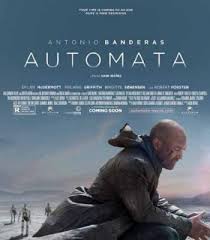
AUTOMATA
US/Spain, 2014, 109 minutes, Colour.
Antonio Banderas, Dylan Mc Dermott, Melanie Griffith, Robert Forster, Tim Mc Inerney, Geraldine Summerville. Voice of Javier Bardem.
Directed by Gabe Ibanez.
Automata is an unusual science fiction film, a co-production between Spain and the United States. It had very limited cinema release. And yet, it is the material of so many films about robots, robotics and the possibilities of robots developing themselves – at the same time, Alex Garland’s Ex Machina was released, a story on testing whether robots could have real feelings or could simulate real feelings.
The tradition on film was developed by such films as Blade Runner or novels by Philip K. Dick, as well as Asimov stories like I, Robot, and Steven Spielberg’s’s AI, Artificial Intelligence.
The central character is played by Antonio Banderas supported by an American cast. The film is visually arresting, a post-apocalyptic future, dystopian society, humans versus robots. It is 2044, there are only 21 million humans surviving, the robots have been programmed to help rebuild the world, cannot harm humans and cannot change themselves. A crisis rises when a policeman shoots one of the robots, allegedly in self-defence, and Banderas, as an inspector, is commissioned to investigate the case.
This also means that there are elements of the thriller along with the science fiction and the futuristic themes.
1. The futuristic theme? Science fiction? Apocalyptic world? Dystopia?
2. Robotics? The movie tradition, I, Robot, Blade Runner, the films of Philip Dick? The robots in this future? Helping humans? The Pilgrim series? The protocols and origins? The skill and invention? Beyond the human?
3. Sets, decor, imagining the future? Costumes? The city? The desert, the mountains? The warehouse? Business offices? Vision of a future?
4. The musical score, the use of classic music?
5. The humans, Jacq, his job, appearance and age? Insurance, examining the robots, the rules and protocols? The robot being shot by Sean? The discussions with Robert? His task? Tired, wanting a transfer? Rachel, his relationship, her pregnancy, the tensions, her decision? Jacq and his being on call? His personality?
6. Sean, like the western gunslinger, police, arrogant attitudes, confrontation with the robot, shooting it? His relationship with the authorities, company, encounters with Jack, clashes, further shootings? His death?
7. Jacq Venturing out, warned not to, being shot at, the confrontation with Sean? Meeting Dupre, Cleo and the robots? Her ideas, her death? His being taken, by the robots, needing water? The search for the mind behind the robots in the protocols, the assumption that the protocols were from humans, not from the robots and their advances? The shooting?
8. The office, the boss and ruthlessness, the discussions about the protocols, Robert and his amazement? Robots’ power and control? Intelligence beyond the human? The risk to the humans if the robots took power?
9. The pursuit, the vehicle, ruthless shootings? Rachel, having given birth? Being abducted, the baby? Held as hostages?
10. Jacq, the encounter with the robots, being led by Cleo? Meeting the intelligent robot, and surprised? Genial and friendly? And the pursuers? The boss and his arrogance? Robert shocked, his warning to Jacq?
11. The robots, their help in fixing the car? Confrontation by the official? The official, his pursuit to the roof, his fall into his death?
12. Cleo, the dance the possibilities of emotion? Rescuing Rachel and going to the sea?
13. The futuristic vision, the machines? The role of robots? The relationship with humans?
Published in Movie Reviews
Published in
Movie Reviews
Tagged under
Saturday, 18 September 2021 19:56
Love Punch, The
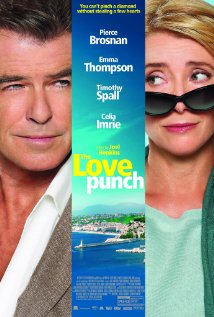
THE LOVE PUNCH
UK, 2014, 94 minutes, Colour.
Emma Thompson, Pierce Brosnan, Timothy Spall, Celia Imrie, Louise Burgoin, Laurent Lafitte, Marisa Berenson, Tuppence Middleton, Jack Wilkinson.
Directed by Joel Hopkins.
If a light film caper, featuring Pierce Brosnan looking dapper, even if older, and Emma Thompson, bright and breezy as usual, with a Riviera setting, then this is your film.
There is also amusing and entertaining support from Timothy Spall and Celia Imrie, who let themselves become involved in the caper, the bringing down of an obnoxious Frenchman who has absconded with funds.
This is not meant to be a profound film, just something of a soufflé entertainment.
It was written and directed by Joel Hopkins, who has made only three feature films, Jump Tomorrow about an inter-racial romance, and Last Chance Harvey, a comedy, again with Emma Thompson, joining with Dustin Hoffman.
1. A caper, romantic comedy, the world of finance? How real – contrived?
2. Surrey, the suburbs, the streets? The artificial golf course? London and business? Streets and offices? Paris, the office, the hotel, the landmarks? the Riviera? The Carlton hotel? The shadow? The cliff? The exotic touch? The musical score and songs? Especially during particular action, in the caper, the humorous connection with the lyrics?
3. Kate and Richard, their marriage, too young, his infidelity, the children, the separation, his women, her friends – and the local suitor? Pen and Jerry and their matchmaking?
4. Kate, Emma Thompson and her presence, delivery, comic touches? Pierce Brosnan, the old Bond persona, laid back? Jerry, friendly, the past stories and invention, pen and her amazement at not knowing them? Her excitement?
5. Richard going to work, the woman walking out on him? Meeting Doreen, the list, arrival, amazement at the takeover, the bankruptcy? His going to see Kate, wondering what to do, the stupid idea of the robbery, but brilliant?
6. The news item about the auction and the jewel? Going to Paris, Kate and her collapsing routine, the boss, his bland and amoral comments, legal and illegal? Their being ousted? Seeing the fiance, the car, following, the comic driving in Paris? The decision to go to Cannes for the wedding? Contacting Jerry and Pen, the arrival?
7. Cannes, going to the party, Kate playing volleyball, the waterskiing, falling into the water? The conversations with Manual, her listening?
8. The plan, for the robbery, the execution? The son and his hacking the computers, getting information? The Texans, arriving, tying them up while disguised as staff?
9. The plan, the climbing, looking like Texans in heavy make-up, missing the couple? Society, going upstairs, on the balcony, Richard and dizzy, slipping? so many flats, past indications of Kate’s? The girlfriend, the explanations, the decision to help, discussions, the plans? Giving her the jewel? Downstairs, passing the diamond? The real Texans, hotel, released, going to the party? Security? Kate and Richard and, the alcoholic security? Into the cliff? saving them? Jerry swallowing the diamond? Recovering it?
10. Kate, her friend, the boat, the night, the realisation of love for Richard?
11. The window, Kate, all well, the recovery of the diamond, the contact? The money transferred into the accounts of the people in the company? motivation for the robbery?
12. The daughter, Edinburgh, Kate? The phone calls? Matt, effective – and his slovenly roommate being seen on Skype?
13. Happy ending, pitting bridges on the boat,? Ex to non-Ex?
Published in Movie Reviews
Published in
Movie Reviews
Tagged under
Saturday, 18 September 2021 19:56
Strangerland
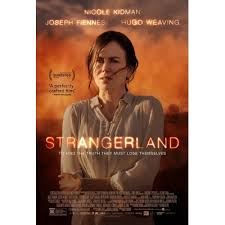
STRANGERLAND
Australia, 2015, 112 minutes, Colour.
Nicole Kidman, Joseph Fiennes, Hugo Weaving, Madison Brown, Nicholas Hamilton, Meine Wyatt, Lisa Flanagan.
Directed by Kim Farrant.
Strangerland was filmed around Broken Hill, a location that may seem familiar to many Australian audiences but, in fact, is rather remote. The town in the film resembles many country towns, especially those in the outback, small towns, for instance, in north-western Queensland. Which means that this is a strangerland to most audiences.
We are introduced to the Parker family who have moved to this town from another not so far away – although the reason is not made clear until later in the film and is key to understanding the tensions within the family. The mother, Catherine, is played with quite some intensity by Nicole Kidman. Her husband, Matthew, played by Joseph Fiennes, is the local pharmacist. They have two children, Lily, a rather precocious and sexually curious teenager, and Tommy, younger, intense, who tends to brood.
The film is beautifully photographed, catching both the dreariness of living in this town as well as the beautiful desert and mountain scenery that surrounds it.
Many audiences could identify with the seeming ordinariness of the Parker family, the tensions with the children, the mother and her concern, the father and his strictness, the daughter and her wanting to, rebel, going down to the local skateboard rink and flirting with the teenagers – and more, using her brother as a cover.
The key element of the film is the disappearance of the children and the search for them in the desert and the hills, led by the local policeman, played by Hugo Weaving. Early in the search, it is impeded by an enormous sand storm enveloping the town, the locals having to clean up before they can go to search.
While the policeman is quite phlegmatic, Catherine and Matthew are highly emotional, Catherine sometimes going, over the top, especially in some sexual advance sequences as well as her going out into the desert, stripping, and walking through the main street. Matthew is too often restrained in his emotions, but bursting out in anger, against a teacher who had a relationship with his daughter, against a young aboriginal man who works at his house, suddenly breaking loose and bashing him.
The cross-section of people in the town is familiar enough, the tendency to redneck attitudes, the idle teenagers, the aborigines who are part of the town and yet not quite.
While the film does come to some kind of resolution, it is not quite… Which leaves the audience identifying with the situation, if not the exact feelings, of the parents, realising that this kind of disappearance can easily happen, happens quite often, leaving a hole in the lives of the parents.
With interesting performances, with fine photography, there are many things to commend about Strangerland – but, while watching it, there is the feeling that for many, situations, performances are sometimes too melodramatic to be satisfying.
1. The title? The outback, the desert? The outback town? Its effect on people?
2. The locations, the detail of the town, the town centre, shops, the police station? The outback beauty, desert, mountains? The musical score?
3. The cast? Australian and international?
4. The dramatic plot, melodramatic treatment?
5. An Australian story, universal themes? Family, relationships, pressures, children’s disappearance?
6. Catherine, as a character, her presence in the family, in the town, her age, experience, the marriage, the difficulties in the relationship, her care for her children, love for them? The move to the new town? Discipline for the children? Her relationship with Matthew, his age, experience, tense? His work as a pharmacist? His severity with his children? The issue of Lily going to the concert?
7. The characters of Lily and Tommy, the gradual revelation about Lily, her background, the affair with teacher, the effect on her personality, discipline,
promiscuity? Tommy, walking in the night, his relationship with Lily, his age, getting the money from his father, going with Lily to the skateboard area, relationship with the boys, the relationship with Steve, the sex, the later revelation of ‘the box’? The reputation? Wanting to go to the concert, her father’s refusal, her reaction? Her room, the diary? Matthew seeing them go?
8. Tommy, his age, experience, walking, the boys, the effect on him?
9. The children lost, their parents’ reaction, Catherine waking, contacting Matthew at the pharmacy? Contact with the police? Ray, his handling the case, organising the search? The groups and their searching the desert? The limits of investigation?
10. The sandstorm, Catherine and Matthew in the car? People cleaning up afterwards?
11. Ray, as a character, policeman, his relationship with Coreen? Friendship with Burtie? With Jarra? His own life, separation, his wife leaving him, his daughters? The affair? His job? Working alone? The interrogations, his keeping calm? Clashes with Matthew? The attraction to Catherine? Catherine and her reactions?
12. Coreen, the affair with Ray, Burtie as her brother, Jarra as her son? Bringing the food for the family? Jealousy?
13. Burtie, his accident and the scar, his mental abilities? Working for Matthew? The relationship with Lily? In her diary, the photos, his being upset that she did not tell him she was leaving? Burtie and his friendship with Ray, Ray explaining the situation, Lily’s age, warning him cash? Catherine and her upset? Matthew’s reaction, bashing Burtie?
14. The toll of the disappearance on both Matthew and Catherine? Catherine going out, in the car, searching, Matthew turning back? Catherine and her emotions, the sexual advance on Matthew, his reaction? Her past and the influence on Lily, Matthew’s taunts? Catherine making an advance on Ray, his backing out?
15. Matthew and his anger, his talk, seeing the children go, finally telling this to Catherine? In the desert, finding Tommy? In the hospital, Catherine’s desperate reactions? Wanting information? His travelling to the other town, the background of the teacher and the affair, his challenging the teacher, the teacher’s wife and her reaction? The court order and restraining him? Clashes with Ray?
16. Catherine, reactions, going to the desert, shedding her clothes, walking naked through the town, people’s reactions? Coreen covering her? Her desperate talking with the grandmother about the spirits?
17. Understanding that Lily had gone, Tom’s information about her going in the car, having to accept this reality?
18. The touches of melodrama, especially in behaviour?
19. The fact that this kind of situation happens, families, effective parents, having to accept that children leave?
Published in Movie Reviews
Published in
Movie Reviews
Tagged under
Saturday, 18 September 2021 19:56
Time of Favor/ Ha-Hesder
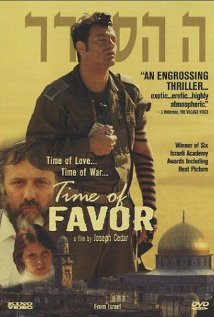
TIME OF FAVOR/ HA-HESDER
Israel, 2000, 102 minutes, Colour.
Aki Avni, Tinkerbell,Idan Alterman, Assi Dayan.
Directed by Josef Cedar.
Time of Favor is an Israeli film which was made before the Intifada of 2000 and the events of 11 September, 2000. However, it was released afterwards.
The focus is on Israel and a settlement on the West Bank. It shows a group of young zealots who are inspired by the charismatic Rabbi Meltzer (played by veteran Israeli actor Assi Dayan, son of the celebrated General Moishe Dayan). One of the young men wants to marry the daughter of the rabbi. However, she is attracted to yet another member of the group.
The Secret Service fear that the rabbi will lead his young men to terrorist acts. When one of them does, the young woman's boyfriend is chosen to lead the Secret Service into the tunnels under Jerusalem to try to apprehend the maverick terrorist and to stop an explosion in the city.
The film is interesting in it setting up a scenario of terrorism within Israeli camps, rather than in terms of Arab-Israeli? clashes. The film is written and directed by Josef Cedar, who grew up and trained in the United States. Cedar was going to direct several significant film is, performed, Footnote, Oppenheimer Strategies.
The film is average in its acting, dramatic tension and presentation. However, it is the characters and issues, the insight into aspects of Israeli life, fears and aggression which make the film worth seeing.
1. A significant film of 2000, drawing together Israel’s history and conflicts up till the new century, the new millennium? The status of conflict in 2000? The Intifada? The consequent conflicts and tensions in the 21st century?
2. The director, Israeli background, American background, his views of Israel, its politics, religious influences and politics, his sensitivity to Israeli life?
3. Jerusalem, the city, the different districts, more religious, more secular? The details of the city, homes, streets? Political and religious tensions?
4. The Israeli authorities, their concern about the rabbi, his followers, religious intensity, possible fanaticism, potential for violence within the community?
5. The character of the Rabbi, played Assi Dayan (and the political background his father, Moishe Dayan)? His influence, his teaching? Age and experience? Love for his daughter? His ambitions for Menachem? His admiration for Pini and his academic talent, commissioned for the marriage?
6. The army, observing the Rabbi? Mossad and its also observing him? Apprehensiveness about his ambitions, his military moves?
7. The movement for praying on the Temple Mount, his managing of the Yeshiva, the students, peaceful expects, militarism?
8. The film moving into the modes of the thriller, Menachem and his platoon, promoted, the better men, but the images of the bomb, suicide bombers and their motivations?
9. The Rabbi’s daughter, a not being interested in Pini, her being more interested in Menachem?
10. The rabbi observing this, the scholar, his attitude towards Menachem, the movement, some jealousy, military moves?
11. Menachem and Michal, together, the conflict with the rabbi? Michal and her father’s choice of Pini to marry, without regard for her own views, Her interpreting this as his not having any personal love for her?
12. The effect of the influence of Michal on Menachem, his love for her, being able to give up the rabbi’s ambitions, become more humane, achieve an appropriate manhood?
13. An interesting picture of Israel at the turn of the millennium, the focus on internal politics and policies rather than relationships with the Palestinians?
Published in Movie Reviews
Published in
Movie Reviews
Tagged under